- Home
- Robert Graves
Seven Days in New Crete Page 10
Seven Days in New Crete Read online
Page 10
Perhaps this brutch in the field by the Doctor’s house was no more than a concise record of all the misery and shame and desperation of my affair with Erica – I had managed that part of my life very badly indeed – which had lain dormant for I don’t know how many centuries until revived by our sudden meeting. No: wait a minute! Apparently the farmer had neglected the drainage of that field for some weeks before my evocation. But that still made sense – Erica’s coming had revived the brutch strongly enough for him to avoid this corner, though he hadn’t formulated his reasons for doing so until I’d come along and it had flared up. However, it was stupid to be speculating on the nature of this brutch until I could form some general theory about Erica. How did she get here, what was she doing here? She seemed real enough, or at least as real as I was: she had pulled my head down and kissed me with firm, warm lips. I could hardly dismiss her as a cosmic coincidence. Yet See-a-Bird evidently knew nothing about her, and had stubbornly refused to believe that I’d seen her enter the Nonsense House.
On the other hand, she might easily be using that place as her hide-out. Once she had bluffed her way in – and no more shameless gate-crasher than Erica had ever existed – who in the outside world would be any the wiser? Apparently what the elders did and said, and whom they entertained, was nobody’s business but their own. I didn’t suppose that it even figured in the barber-shop gossip. Perhaps, when the right moment came, I ought to tell Sapphire about the meeting, after all.
The last of the cigarette stubs had been burned in the fire and we could talk again. Sapphire turned to me, and said gently: ‘I have been thinking about the brutch. Did you by any chance cross the park while I was away?’
‘Yes,’ I answered, ‘just before lunch. Sally gave me permission.’
‘What were your feelings at the time?’
‘I felt rather lost without you: I was thinking about the old days, when my house still stood in the middle of what’s now your park, and when I used to take the children down to the sea for a bathe, where there’s now only cornland. And I also felt cross…’
‘And then you had a vision of a young woman going into the Nonsense House?’ See-a-Bird prompted me.
‘Not a vision. She was real enough.’
‘What was she like?’
‘She was wearing a sort of white… wollacombe… widdicombe… I wish I could remember that word. And green slippers.’
‘Green slippers? Are you sure?’
‘Grass-green. I noticed them particularly. All right, then: here’s a police description of the wanted woman. Fair, rather curly hair, pointed chin, long upper lip, sparrow’s egg-blue eyes, good figure, medium height, ballet-dancer’s legs, square hands – and she bites her nails when she’s cross…’
‘Then she was cross too?’
‘No, not when I saw her. On the contrary, she was feeling very gay. If you’re interested, I can tell you more about her. She has a scar on her scalp where a man once tried to brain her with an ice-pick; and a bullet-graze low down on her ribs where a woman once tried to shoot her with a small automatic pistol. She was educated at Geneva; smokes Gauloises cigarettes for choice; is an expert fudge-maker and a champion figure-skater; has a code of morals peculiarly her own; and says she lives in that Nonsense House of yours by the mill. She knows all of you, claims to have read Fig-bread’s and Starfish’s poems, and plans to visit us soon. Her name’s Erica Yvonne Turner, though she doesn’t use the Yvonne, and I wonder you haven’t told me before that she’s been brought here. I used to know her well. Rather too well; but perhaps you’re aware of that, which is why you’re keeping me in the dark about her.’
They all looked puzzled and a little scared. Sapphire said to Sally: ‘It’s a brutch all right: something, I’m afraid, that he’s brought with him accidentally. In a dream perhaps? No, I don’t think so, do you? At his evocation another spirit, a woman’s, must have clung to his hair and made the time journey in his company. A case of the sort is quoted in the third Book of Magic, in the Aldeboran chapter, you remember. But I don’t at all like the sound of those green slippers and I’m surprised that we saw no trace of her when his wraith manifested itself. Perhaps she hid at the back of the pit?’
Then she said to me: ‘I swear in the Mother’s name that we know nothing about all this. Do you think this woman can have been bold enough to come with you?’
‘Clinging to my hair? It’s possible. She’d get into anyone’s hair. Why, that girl once bluffed her way into the Royal Enclosure at Ascot, for a bet, by slipping her arm through the Archbishop of Canterbury’s and pretending to be his daughter.’
That seemed to convince them all and they got up to go. As we went through the park to the Doctor’s house they were discussing ways of catching and deporting Erica. When we reached the corner of the mill-field Starfish suddenly stopped and pointed. ‘That’s what your mare shied at, Sapphire,’ he said gravely.
‘What is it?’
‘A cigarette stub, but it’s wrapped in paper, not leaf.’
They all hesitated to touch the ill-omened thing, so I picked it up and said: ‘Yes, didn’t I tell you that Erica Turner smokes Gauloises?’
They shrank away. ‘It must be burned quickly. And afterwards we’ll have to purify your fingers.’
‘But the brutch?’
‘The field must first be fumigated with sulphur thrown on a bonfire of wild-olive and then swept in both directions with a birch-broom.’
‘But suppose Erica goes on dropping stubs all over the village just to annoy you?’
‘If, as you say, she’s lodged in the Nonsense House,’ Sally said, ‘we’ll have to wait until midnight, when the Elders will have gone home; I’ll deal with her then.’
I dropped behind and furtively picked up the other stub where I’d thrown it down just outside the orchard; then I crushed them up together and burned them at the back of the dining-room grate. Sapphire purified my fingers with rose-water in a silver bowl and a short prayer.
We settled down for a pleasant evening around the fire. There seemed to be a general agreement to drop the subject of the brutch, and Sally asked no more leading questions and gave no more tart answers. From the friendly way she behaved towards me and Sapphire I decided that Erica had been making mischief as usual, and that there was no truth at all in that love-and-jealousy story.
I asked whether the leave-taking ceremony at Court had gone off well.
‘Most propitiously,’ Starfish replied. ‘The King’s dignity was superb; anyone would have thought that he was only going on a short holiday.’
‘But what is going to happen to him?’
‘He’s going to die, of course.’
‘And why?’
‘Because his term ends this Friday when the moon is full.’
‘Will he kill himself?’
‘No. His other self will kill him.’
‘Doesn’t that come to much the same thing?’
‘Not at all. As we say: “The right hand cannot be thrust into the left glove”.’
When I’d worked that out, I asked: ‘Tell me, who’s the next king to be?’
‘His other self, who reigns until midwinter; the left hand to his right hand.’
‘Perhaps I’d understand that better if Sapphire would consent to explain what a nymph of the month is.’
‘It’s like this,’ Sapphire said. ‘The king’s reign begins at mid-winter and he has thirteen consorts, who are called nymphs of the month. All are commoners but myself and one other, and we’re all Queen in turn and share his bed during our respective months, and put him through his paces. The ritual is rather complicated and one can’t afford to offend the Goddess by omitting any detail. In the seventh month he dies, and his other self reigns until the thirteenth month, when he dies too.’
‘And your month is the sixth month?’
‘It ended nine days ago. We’re now in the seventh.’
‘So last month you were the Queen?’
‘Yes.’
/>
‘And the King was your lover?’
‘Not in a carnal sense. The sixth month is the month of enforced chastity, so he and I lay in a bed with a labra – a double-bladed axe – between us. He’s not allowed to have his hair or nails cut or to wear new clothes, and has to go about with a thorn-broom in his hand and keep to magicians’ diet. But now he’s having a glorious time again: the Queen gives him whatever he asks for – it’s unlucky to refuse him anything, even if it’s against custom.’
‘No double-bladed axe in his bed now?’
‘Of course not.’
‘Wine, women and tobacco at his call day and night?’
‘Yes.’
‘In his last month, would a king be allowed to go for a long railway journey if he pleased, or learn his A.B.C., or talk during meals or whistle in his bath?’
‘I suppose so.’
‘And by the time he comes to the drop he’s so pickled and gorged and fagged-out that he doesn’t care very much whether he or his other self is to reign for the second half of the year? Is that the idea?’
‘The Goddess is always merciful to fools.’
Chapter IX
The Santrepod
They told me that there would be music at sundown. I had already gathered that music was never used as a casual entertainment, but was reserved for special religious occasions. So I asked: ‘In celebration of what?’
‘Of the Goddess, Sir, always of the Goddess,’ said Starfish. ‘This will be a performance of the Santrepod.’
‘And what, may I ask, is the Santrepod?’
‘A group of three songs proving her triple power.’
‘And why are they to be played this evening?’
‘To introduce Monday, the Magicians’ Day, the day of enchantment. Music is similarly used by the recorders to introduce Wednesday, the day of learning; by the captains to introduce Thursday, the day of authority; by the servants to introduce Saturday, the day of humility; and by the commons to introduce Sunday, the day of royalty. We begin our days at curfew of the previous evening.’
‘What happens to Friday? And Tuesday?’
‘They’re not observed by any particular estate. Friday is the day of love and Tuesday is the day of war. In love, as in war, when a magician may belong to the same band as a commoner, differences of estate may occasionally be transcended.’
‘Do you mean to say that on a Friday one is free to have a love-affair with a woman of a different estate?’
‘Yes. Only we say it the other way about: a woman may choose a lover from a different estate.’
‘And does she ever?’
‘Very seldom, except for the customary union of captains and commons. “Smokes do not mix,” as you know, and if for instance a woman magician falls in love with a recorder, or a recorder with a woman servant, and they form a Friday union, they’re “without benefit of estate” while the union lasts. That’s the subject of many of our stories, but a very awkward position to be in. When Saturday comes the lovers go to consult the Goddess, whom they must obey, whatever her orders. Sometimes she lets them off lightly; sometimes she torments them. Well, as I was saying, there’ll be a Santrepod when the curfew sounds. By the way, See-a-Bird tells me that all isn’t well between you and Sally. The Santrepod should remedy that.’
I stirred uneasily in my chair. ‘There was a slight misunderstanding this morning,’ I said. ‘It was my fault, I expect. I like Sally very much,’ and here I gave her what was intended for a friendly smile, but that was a mistake. Erica’s arrows had penetrated deeper than I cared to admit to myself, and it must have been pretty obvious that my smile was forced. Sally may even have read my thoughts and felt that I was throwing her a bone. ‘You’re very generous,’ she said, and stiffened noticeably.
Starfish bent down with a look of concern, removed one of her shoes and started gently kneading her foot. She sighed with satisfaction. I didn’t inquire whether this was a common sedative practice among magicians, or in New Crete generally, or whether it was a peculiarity of Sally’s that she liked having her feet kneaded. I never saw it done again.
With a grateful glance at Starfish I asked Sapphire whether there was any fundamental difference between the music of the various estates.
‘Of course,’ she said, and explained that the commons went in for part songs, military marches and dance tunes, played by fiddle, pipe and drum, and for other sorts of traditional popular music, none of it recorded in the archives: they played solely by ear and were given no formal musical education. But musical practice varied geographically, certain instruments in popular use being confined by custom to different kingdoms. I gathered that the flute belonged to what is now called France, the mandoline to Italy, the guitar and castanets to Spain, the accordion to Germany.
‘Shades of Bach!’ I exclaimed. ‘The accordion!’
‘The climate of Germany encourages spiritual pride and the accordion is the most homely of instruments.’
‘And who gets the saxophone?’
But she hadn’t heard of the saxophone.
The recorders, she told me, neither danced nor sang and limited themselves to piano recitals (but the New Cretan piano had a shortened keyboard) and the string quartette. Their music was intellectual and passionless in the manner of the eighteenth century; nothing happened in it – Sapphire meant that melody was jealously excluded – but they derived a great deal of satisfaction from an ingenious exploitation of musical theory. They had now taken theory far enough and acquired a sufficient body of music to satisfy their needs; their Canon was complete. The captains shared the music of the commons, though specializing in the trumpet. The servants chanted plain-song from a limited repertoire and played no instruments of any sort.
‘What about the magicians?’
‘You’ll be able to judge for yourself in a moment. We don’t dance and we don’t have choirs and orchestras. We concentrate on pure melody and sing either to the harp or the lute; only one voice and one instrument, and never with more than four or five people present. Our musical education is rather austere; it’s based on the songs in our three Books of Music and a close study of counterpoint.’
It was getting dark. The curtains were drawn and the candles lighted. Everyone stopped talking when Sapphire opened a chest and took out her lute. She spoke a few words of reverent dedication, paused for half a minute and then began singing to it. The words were New Cretan, but, to my surprise, the melody was Elizabethan: I recognized it at once as ‘Flow not so fast, ye Fountains’ by John Dowland,
… whose heavenly tuch
Upon the Lute, doeth ravish humaine sense
as Barnfield (or some say Shakespeare) wrote of him.
Sally sat completely motionless, but the men had risen and were holding out their hands, palms outstretched, in the attitude of prayer. Knut Jensen’s advice came grotesquely to my mind. ‘And remember, when they start hopping about and wagging their genitals and rubbing mud in their hair and rolling their eyes, you’ll attract far less attention if you join in the fun than if you just sit goggling at them and fiddling with your note-book. Always join in the fun, old boy, always join in the fun! It’s the safest way.’ I rose too, and held out my hands. Indeed, I felt disposed to pray: Sapphire’s voice and her touch on the strings were so perfectly controlled that the full sorrow of the music, the lachrymae as Dowland called them, came welling out without distortion or loss. My eyes soon began to smart, and I wept unashamedly, relieved that there was no need to fight the impulse in the heroic English manner.
She sang two more songs – the first by the celebrated Cleopatra, very stately and scornful, but with funny little grace-notes when least expected, called ‘Heather’s Mockery of Holly’ at which everyone was expected to laugh. Everyone did laugh, including myself, because Sapphire again let the song speak for itself. There was no need for any pantomime business to point its dry humour.
The last song, called ‘The Sleepy Lovers’, was written by Alysin, the most celebrated
musician of recent times. Now, I don’t pretend to know much about music but, as Barnfield pointed out in that very sonnet, music and poetry are ‘the sister and the brother’, and I find that if I apply poetic standards to music I am seldom far out in my judgements. Cleopatra’s song, though of a different type from Dowland’s, was of the same masterly order; but the ‘Sleepy Lovers’ left me unmoved. It was meant to make us feel drowsy, and Sapphire gave us the clue by smothering a yawn. Everyone but myself reacted as she intended. The three men swayed on their feet and at last sank gracefully to the floor, Sally’s head dropped forward on her chest, and when finally Sapphire broke off in the middle of a bar they were all dutifully asleep.
I continued to stand with palms outstretched: an irreproachable attitude of respect to the Goddess, but a criticism of the music, which was not nearly good enough. Technically it may have been flawless, yet I felt that it was synthetic. Alysin, when he wrote the song, had not felt amorously drowsy as Dowland felt lachrymose, or Cleopatra drily humorous – he had been wide awake and industriously deducing from his memory of popular lullabies what combinations of mode, key, time and so on, have the most soporific effect. Doubtless he had invoked the Goddess in the approved style, but she was not present in the song, as she was in the other two – yes, Dowland, I remembered, had turned his back on Protestantism and returned to the Blessed Virgin for his inspiration – and I refused to be deceived. However, since everyone else, including Sapphire, had dozed off, by autosuggestion, nobody noticed my obstinate wakefulness. I decided that I could now, with propriety, return to my chair and sat there feeling rather at a loss. Instinctively, my hand went into my pocket for a cigarette.
A slight giggle aroused me. I turned round sharply and saw Erica tiptoeing into the room. I waved her back wildly, but she took no notice.

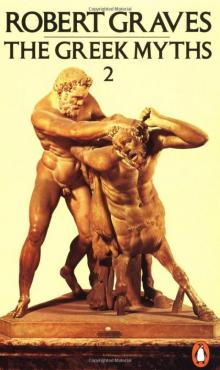 The Greek Myths, Volume2
The Greek Myths, Volume2 The Anger of Achilles: Homer's Iliad
The Anger of Achilles: Homer's Iliad Count Belisarius
Count Belisarius The Twelve Caesars
The Twelve Caesars Complete Poems 3 (Robert Graves Programme)
Complete Poems 3 (Robert Graves Programme) Homer's Daughter
Homer's Daughter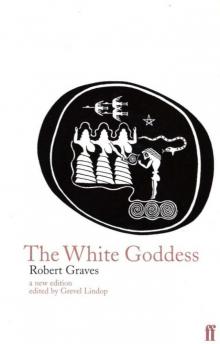 The White Goddess
The White Goddess Goodbye to All That
Goodbye to All That Claudius the God and His Wife Messalina
Claudius the God and His Wife Messalina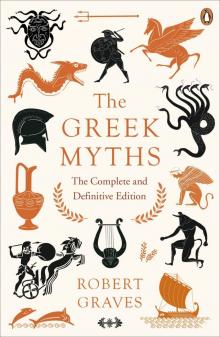 The Greek Myths
The Greek Myths I, Claudius
I, Claudius The Islands of Unwisdom
The Islands of Unwisdom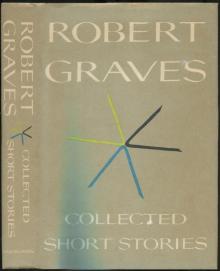 Complete Short Stories
Complete Short Stories The Golden Fleece
The Golden Fleece They Hanged My Saintly Billy
They Hanged My Saintly Billy King Jesus
King Jesus Sergeant Lamb's America
Sergeant Lamb's America Hebrew Myths: The Book of Genesis
Hebrew Myths: The Book of Genesis Seven Days in New Crete
Seven Days in New Crete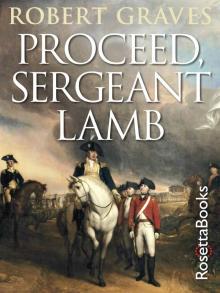 Proceed, Sergeant Lamb
Proceed, Sergeant Lamb Claudius the God
Claudius the God Wife to Mr. Milton
Wife to Mr. Milton The Complete Poems
The Complete Poems The Anger of Achilles
The Anger of Achilles Claudius the God c-2
Claudius the God c-2 Hebrew Myths
Hebrew Myths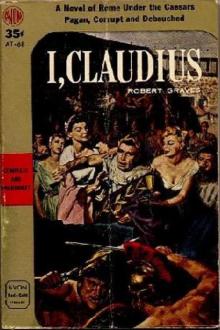 I, Claudius c-1
I, Claudius c-1 The Greek Myths, Volume 1
The Greek Myths, Volume 1